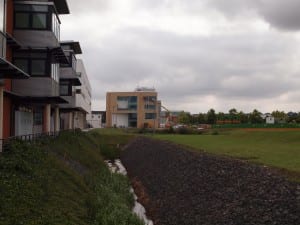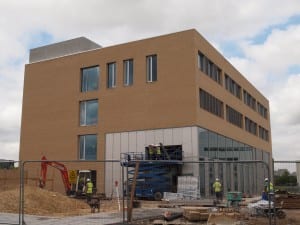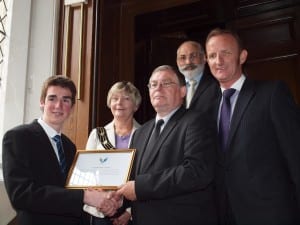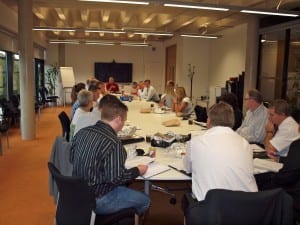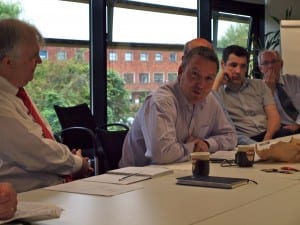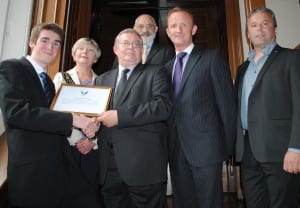
Seventy years after the first UK jet powered flight took off from Lincolnshire’s RAF Cranwell using Sir Frank Whittle’s turbojet engine, one young engineer from the county is thanking his pioneering forebear for inspiring another first.
Carl Hockley, a student on the BEng Mechanical Engineering course at the University of Lincoln’s School of Engineering, has received the first ever Sir Frank Whittle Bursary – an award set up by Aviation Heritage Lincolnshire, in memory of Sir Frank Whittle. The award recognises nineteen-year-old Carl’s academic achievements and his enthusiasm for promoting both the new School of Engineering, and engineering itself, over the last year.
The City of Lincoln Council has sponsored the first Bursary – worth £3,000 – which was presented to Carl by the Right Worshipful, the Mayor of Lincoln, Councillor Kath Brothwell.
Carl said: “When I found out that I had been awarded the bursary, I was taken aback by it and actually speechless. It took a while to sink in and gave a feeling of immense gratitude for being chosen for it.
“The strong tie in with industry that the course has through its link with Siemens and various other companies, as well as the fact that it is the first school of engineering in such a long time, made coming to the University a very exciting prospect. Further to this, the offer of sponsorship through my degree from Siemens brought a more career orientated aspect which I didn’t feel anywhere else had to offer.”
Dr Jill Stewart, Acting Head of the University of Lincoln’s School of Engineering, said: “Carl has been very popular with the schools that have attended various engineering and University events over the year, and he has always been prepared to take a leading role in running these activities – most recently, the ‘Maths at Work’ event held at the University.
“We’re incredibly proud of Carl – he is a talented and creative engineer and it seemed appropriate that he should receive the first award made in the memory of the exceptional engineer, Sir Frank Whittle.”
The award, which was set up this year by Aviation Heritage Lincolnshire, will now be made annually in memory of Sir Frank Whittle. It commemorates 70 years since the first jet powered flight in the UK made by the Gloucester E.28/39 using Sir Frank’s turbojet engine at RAF Cranwell in Lincolnshire.
Phil Bonner, Aviation Development Officer for Aviation Heritage Lincolnshire, said: “Although Aviation Heritage Lincolnshire looks to raise the profile of the county’s rich aviation heritage we are very much involved with young people through our outreach and learning programme. The Sir Frank Whittle Bursary not only celebrates the past but looks to invest in the future.”
Councillor Neil Murray, Portfolio Holder for Planning Policy and Economic Regeneration at the City of Lincoln Council, added: “We are incredibly proud to sponsor the first Sir Frank Whittle Bursary. We see engineering as one of Lincoln’s most important industries, so we’re keen to support the School of Engineering, as well as local businesses.”
The new purpose built School of Engineering will open this summer on the University’s main Brayford campus. It is part-funded by the European Regional Development Fund (ERDF) from the European Union. Other funding sources include emda, HEFCE, Siemens Industrial Turbomachinery Ltd, Lincolnshire County Council and the University.
The collaboration between the University and Siemens Industrial Turbomachinery Ltd has already been commended by the Institution of Engineering and Technology (IET). It was one of only five projects shortlisted for the Team award at their recent Innovation Awards which celebrated the products, technologies and processes that lead the way in engineering innovation.
Carl is already thinking about his future career in the engineering sector and plans to go on to achieve chartered engineer status. Ultimately, he hopes to be able to use his skills creatively and said: “In an ideal world it would be incredible to solve a complex problem that benefits the world in a manner that creates real change for the better.”
